MARTIN BRAMAH
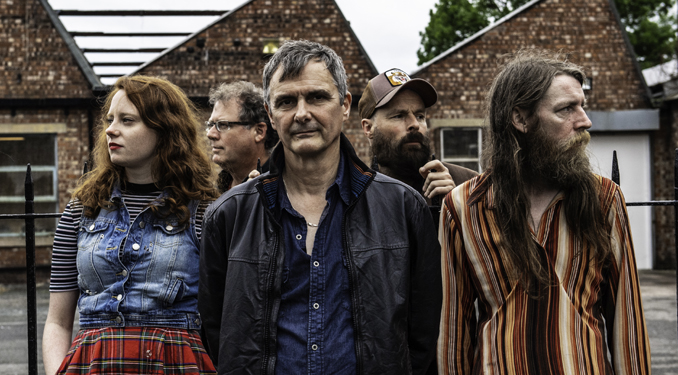
The Blue Orchids' current lineup, taking a break from the recording of Speed the Day
Left to right: Tansy McNally, Vince Hunt, Martin Bramah, Howard Jones, John Paul Moran.
Founder of the Fall & Blue Orchids
interview by John Wisniewski and Jason Gross
(February 2021)
UK radio legend John Peel called them 'The Mighty Fall' and anyone who's a fan of punk or indie music would be hard-pressed to argue with that. But while a craggy guy named Mark E. (RIP) is almost always now seen as the not-so-cheery face of the band, the fact is that early on, they really were a band and not just him and your granny on bongos, as he once joked. When the band started up in the mid-'70's, there were five actual individuals who made up the band not just a singer and a back-up group. Guitarist Martin Bramah was one of the founders of the Fall and on the group's 1979 debut LP (Live at the Witch Trials), he co-wrote most of the songs with said MES. But then Bramah decided to go his own route and started up his own group, the Blue Orchids, right afterwards, along with fellow Fall co-founder and keyboardist Una Baines. Up until around the mid-'80's, the Orchids explored a melodic form of garage rock. Bramah went on to form the band Thirst in '87 with ex-Fall drummer Karl Burns and then briefly returned to record and tour with the Fall in '89/'90. After a fallout with the mercurial Mr. Smith, Bramah revived the Orchids again in the early '90's and then produced his own solo album (The Battle of Twisted Heel, 2008) around the time he also formed yet another band, Factory Star, which featured yet more Fall alumni (Steve Hanley, Paul Hanley). The 2010's saw another return of the Orchids, with additional tours and new releases, including the lovely and loud The Once and Future Thing (2016) and last year's covers album, The Magical Record of Blue Orchids, which is available on Bandcamp alongside several of their other recent releases.
Thanks to Brian Cousins and Reuben Cervera for their help with questions.
PSF: What was the first band that you were in?
MB: My first band was Nuclear Angel. Then I joined The Outsiders Group, which became the Fall.
PSF: How did you meet up with Mark E. Smith initially?
MB: Mark E. Smith came up to me in a nightclub and asked me if I wanted a fight - I said "yes." He said: "I like your spunk, kid - let's start a band" and so we did.
PSF: The early days of the Fall are somewhat mythic to outsiders but as someone inside, could you talk about the origins of the band and what brought all of you together?
MB: We were kindred spirits manifested in a certain place at a certain time. We were misfits determined to carve our own niche. As teenagers, we looked on the adult world around us with disdain and contempt. We had a bomb to drop and music was the only medium capable of delivering it. The group was formed so that we could create our own reality.
PSF: It's said that the Fall was inspired by the Sex Pistols' example. What did you yourself think of them at that time?
MB: Rotten John was a divine messenger, possessed of a lightning bolt. The Sex Pistols were the wake up call to arms. As a band, they had to be experienced live - the records only hint at their significance. For six months, they were my favourite band.
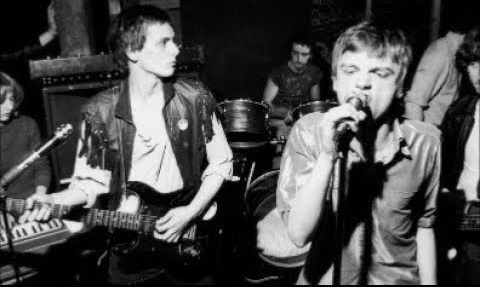
Martin & Mark fronting the Fall in their early days
PSF: The Fall always seemed to be part of and yet not part of the punk scene. How did you yourself see that at the time?
MB: We were more punk than the punks: but we had no need for labels. We were outsiders. The UK punk scene gave birth to dozens of small clubs. This was essential to our emergence.
PSF: Otherwise, outside of the Fall, what did you think of the punk and post-punk scenes and the bands involved?
MB: They were a wonderfully naive breath of fresh air on the whole. A spontaneous, unmanipulated musical movement - at least until big business turned its attention their way. Then, it was mostly assimilated into the industry. A few artists have managed to stand their ground of course, even to this day.
PSF: For early Fall gigs, what were the audiences like?
MB: Our early audience was a mixed bag of punk, prog, heavy rockers, plus their daft mates - so [it was ] a typical punk rock crowd of the time. We received the usual shower of gob and beer cans from the phlegmy plebs. This was our anointment and badge of initiation.
PSF: Did you think the Bingo Master EP [the band's first release] was a good representation of the band and its music at the time?
MB: This EP was our seminal statement - a condensed microdot of our intent. We created something unique to ourselves and our environment, which nonetheless resonated throughout the world. Few bands have achieved this.
PSF: How was the Fall different with and without founding members Tony Friel (bass) and Una Baines in it?
MB: The communal comfort blanket was gone.
PSF: Why did the Bingo Master EP remain unreleased for a while?
MB: New Hormones [Buzzcocks' record label] paid for the recording but didn't want to release it - so it took us a few months to find a label that would put it out.
PSF: How did you and Mark work together on the songs for the Witch Trials album?
MB: We'd been working together for a few years by then so we knew what we wanted to achieve. Mark chose a group of songs that covered the band's history to that point and I arranged them and rehearsed the band to a standard where we could go into the studio and work quickly to capture the moment live in house.
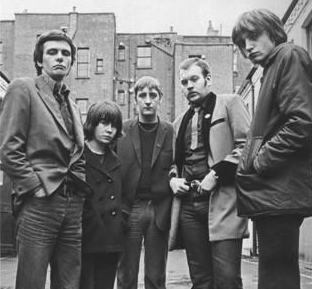
The Fall in March 1979 (Martin on the left)- photo by Paul Slattery
PSF: Did you feel that Witch Trials was a change in any way for the band compared to the earlier material?
MB: I don't think there was a stylistic change at that point - we'd become more proficient in expressing ourselves and tighter as a group by then. Maybe that could be seen as a stylistic change but really we had just honed our craft and developed our ideas.
PSF: The Fall has obviously had a long history of members coming and going- did that seem like a problem early on too?
MB: I don't think it was ever a problem for the band. We soon learned to adapt to new members getting involved. The Fall always moved contrary to popular wisdom and most people find that hard to be around after a while.
PSF: Any other fun stories about being in the Fall?
MB: Me and Mark made a teenage pact to always hate each other in public.
PSF: What made you leave the band after the album came out?
MB: I wanted to kill the Fall. I wanted it to die. End. I was feeling destructive and I thought the group would collapse without me... Then I went on to teach my replacement, Craig Scanlon, all the songs in the band's set, so that wasn't too smart. Let's just say "personal reasons," eh? The folly of youth.
PSF: What kind of idea did you have for Blue Orchids went you formed the band? Obviously, you didn't want this to be like the Fall, right?
MB: On the contrary, I wanted to rekindle the original spirit of the Fall in a way. The Blue Orchids' mission statement was to explore the very frontiers of the human psychedelic experience in music. To be dead serious about having fun.
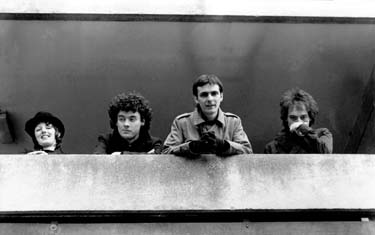
The Blue Orchids
PSF: How do regard the Blue Orchids #1 ('79 to '82) now? How was it different working with Una there as opposed to with her in the Fall?
MB: I regard those first incarnations as miraculous now. We dragged down a higher energy and forced it into our own base realm: the results were chaotic, in a good way. Working with Una Baines in Blue Orchids was just the same as working with her in the Fall.
PSF: Did you see Orchids as part of any music scene then at the time?
MB: We saw ourselves as carrying a torch for those that had glimpsed beyond the veil of any scene.
PSF: John Cooper Clarke championed the Blue Orchids. How did you meet John?
MB: John lived down the road from us - so we hung out in the same local bars and just got talking. Plus we were often playing on the same bill as him. He was a few years older than us and we found him to be fascinating company.
PSF: The early Blue Orchids single "Work" (1981) came to the attention of Echo & the Bunnymen, who liked the single. Could you tell us about this?
MB: The Bunnymen had been following my music since the early days of the Fall, so it's only natural that "Work" came to their attention.
PSF: The Blue Orchids functioned as Nico's backing band and her support act for a period of time. What was it like to work with her?
MB: Working with her was a revelation. Her ability to maintain intent against all the odds was remarkable.
PSF: What do you mean by that?
MB: I meant that she was able to keep her musical career on track despite a lack of or sporadic funding - plus the complication of managing a healthy heroin habit.
PSF: For the Agents of Change EP (1982), the band sounded a lot more confident by then. Did you see it as much of a change from the early singles?
MB: Yes, we saw a big change in perspective, due in large part to working with Nico and exploring her subtle musical landscapes. It gave me more confidence to express the sensitive side of my nature.
PSF: 1982's The Greatest Hit album to me sounds more like the early singles- with a garage/psych feel to it. Did you see it that way or was it a different sort of progression in your mind?
MB: I think The Greatest Hit was more of a bridge, stylistically, between the first two singles and the Agents of Change EP. We covered a lot of ground on the album - but there's an obscure continuity of purpose throughout all our recordings.
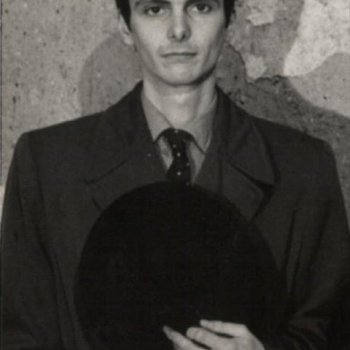
Martin in preacher mode
PSF: Did you find that Rough Trade was supportive of the band?
MB: Rough Trade were very supportive of the band - but looking back I think we pushed that relationship to a breaking point. They wanted me to move to London and work with more organized musicians. I chose to stay in Manchester and hang out with my deadbeat mates.
PSF: Why did the Blue Orchids stop shortly after that?
MB: I needed to reassess my position and my reason for making music. I feared the band was in danger of becoming a commercial commodity and being diluted by the process into a shadow of ourselves. So I killed the beast; or so I thought...
PSF: In 1987, you were in the band Thirst as well. How did that come about?
MB: I'd just left my wife (I was kicked out), and Karl Burns had just left the Fall again (he was kicked out) so we decided to start a rock group together.
PSF: How were you looking for Thirst to be distinct from the other bands you had been in?
MB: With Thirst, we wanted to take the style we had developed in the Fall and Blue Orchids and take it back to our common rock roots. It was a more guitar driven sound. We wanted to lose all intellectual pretensions and just be our rock 'n' roll selves.
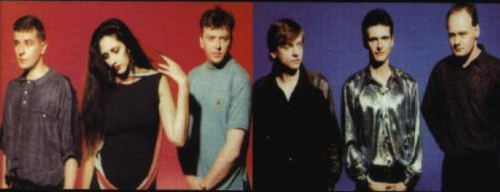
The Fall line-up for Extricate- MES looks over Martin on the right side
PSF: How did you rejoin the Fall for 1990's Extricate? Mark approached you the year before, I'm guessing?
MB: I approached Mark, in fact. I phoned him up out of the blue and suggested we do some writing together. We hadn't spoken for a few years at that point and I felt our disagreements of the past were water under the bridge. I was between bands, Brix had just left the Fall and I saw an opportunity to walk back into the group, which I did.
PSF: How was the Fall different circa 1989/90 compared to the original band?
MB: The Fall had become a business and MES was the boss. The original group was more of a collective of like-minded beatniks.
PSF: What would you say about the songwriting process and recording of the Extricate album?
MB: Extricate was a big budget album. The songs were recorded in at least four different studios over a period of months. We had quite a fragmented approach to writing. Mark worked with various combinations of band members in different locations. Not many of the songs were rehearsed beforehand by the whole band. A lot of the music was developed in the studio.
PSF: Why did you decide to leave the band after that record?
MB: I was fired. I had no intention of leaving. Mark found my behaviour intolerable, it would seem. You'd have to ask him why.
PSF: The 1997 Fall album Levitate had a track that Mark recorded with you on it- "Tragic Days." Did you know about that being included before the album came out?
MB: I had no idea that track was to be included on Levitate. It was a cassette recording of a rehearsal we had at my flat. It was just an idea for a possible new song. God knows why he chose to use it at that point, about eight years later. Maybe he was missing me?
PSF: Did you hear any of Fall albums after you left that you really liked?
MB: I like a lot of Fall albums, in fact. I think that if I hadn't been involved in the group, I'd still be a bit of a fan. It's hard to pick a favourite, though. Slates or Hex, Bend Sinister, this could become a long list...

PSF: How did you decide to restart Blue Orchids in the early '90's? How did it seem different from the way that band was in the '80's?
MB: After being fired from the Fall in 1990, I had to reassess things pretty quickly and working under the banner of Blue Orchids again made immediate sense. It's a name I'm strongly associated with and one from which it seems I can't escape. The differences were obvious ones: it was ten years later, I was ten years older and the only original member of the group remaining. Such is life - we must plow on.
PSF: You recorded The Sleeper album around then also- why did it take 10 years for it to come out (in 2003)? It definitely sounds like an extension of the Orchids' earlier work but also very catchy. Were you consciously trying to change the sound of the band?
MB: The Sleeper (originally titled "Dark Matter Tapes") was recorded in Camden Lock, London. It was a self-financed project that ran out of money nine songs in. Try as we might, we just couldn't get a record deal at that point and so the album got shelved. It eventually came out with a few other songs from sessions recorded in Manchester the previous year. I wasn't consciously trying to change the band's sound. It's just a case of my writing had matured and developed in that direction - plus working with different musicians always gives new textures.
PSF: It's said that Mystic Bud (2004) started as a solo album and later became an Orchids album- if so, how did that come about? It seemed to have a spare sound- what led you in that direction?
MB: It's true, Mystic Bud was pretty much a solo project, with a few friends helping out. I recorded the album at home in Clapham South, London, on a multitrack recorder. However, my record label at the time, LTM Records, thought Blue Orchids was a "strong brand" and very much wanted it to be released in that name, so I agreed. I didn't have a band at that point, but LTM were reissuing some of my back catalogue and asked me if I'd make a new album for them, so I thought I'd make something low key and uncommercial. It's kind of an introverted record, really.
PSF: How did the band Factory Star come together? What was it like working with the Hanley brothers then? Why didn't the band last long?
MB: At that point, I'd just made a solo album, The Battle of Twisted Heel (2008), and played a few solo gigs, but pretty soon I decided I needed a band - a new band and a fresh start, was my feeling, so I came up with Factory Star.
Steve Hanley had approached me, saying he and his brother Paul would be interested in working with me and it seemed like a sterling idea. We had a blast, playing a lot of blinding shows together for a year or so - but eventually I started to feel like the band was carrying three times the ex-Fall baggage that I was used to dealing with, which led to an inevitable fallout. I enlisted a couple of new members and the band went on to record two albums, Enter Castle Perilous (2011) and New Sacral (2012). The band lasted for four years - which isn't that bad!
PSF: The Battle of Twisted Heel had more of a lovely folky sound to it. What led you in that direction and why did you decide to do it as a solo album?
MB: By then, I'd moved back to Manchester and I wanted to make an all-acoustic album and reinvent folk music in the process- but I drifted. This was another home recording, made on a Teak digital 8-track. I recorded the album in my high rise apartment - sometimes sticking the mic outside my window to capture the local ambiance. I played all the instruments myself, except flute, which was played by Charlotte Bill. There was a bit of electric guitar on the odd track in the end - I couldn't help myself. I wanted to evoke the sound of the Irk Valley, in North Manchester.
PSF: Factory Star's 2011 album, Enter Castle Perilous, is an underrated record, IMHO with some elements of the Fall and Blue Orchids to it but something different and something of a progression. Do you see it that way?
MB: I agree with you there. By that point, I had decided to let my more Fall-ish ideas out of the bag and not worry about comparisons. That album was very much reflecting my return to Manchester after fourteen years in London. I had a new overview of the city, a fresh historical perspective. The streets were thick with ghosts.
PSF: The 2010's saw the Orchids reform again- why did you decide to get the band back together again and work with Factory Star members?
MB: In 2012, we were asked to play a few shows to commemorate John Peel's birthday. The promoters wanted us to play a classic Blue Orchids set as a one-off for the occasion, so that's what we did. On the back of that, Blue Orchids were offered more gigs and we became more in demand as Blue Orchids than we had as Factory Star, so it was a business decision. I stopped fighting it and embraced the name.
"Oh, be some other name!
What's in a name? That which we call a rose
By any other word would smell as sweet.
So Romeo would, were he not Romeo called"
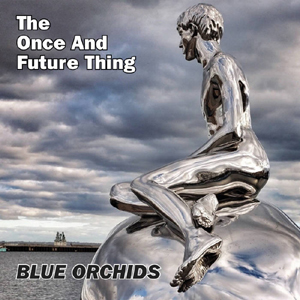
PSF: The Once And Future Thing had the Orchids' sound for sure but also mixed some raving garage rock ("August Rebels," "Motorway") with more slower, mature songs ("Running Blind," "Jam Today"). Did you see it that way?
MB: Yes, for sure. As in the above Shakespeare quote, whatever name I use, I'm still going to write the same songs at any given time - it's all just a vehicle for my writing. The songs don't change just because the name of the band does. I'm on the inside of the process. The name is for the outside world.
PSF: The 2018 album, Righteous Harmony Fist, might be the strongest Orchids record I've heard and maybe the most upbeat too. How do you keep yourself motivated to do quality work like that?
MB: Well, I make records because I enjoy it. It's my calling in life. It makes sense of my life, gives me a perspective. I try and give my best game. I'm always writing for the smartest people I know. To amuse and intrigue them, to have some fun and throw the odd curveball, as it were. The best music creates another world; that is always the intention.

PSF: 2019's The Magical Record Of Blue Orchids is such an interesting curiosity. I'm a Nuggets fan, and I haven't heard any of these songs. What make you want to do a covers album and why did you choose to center it around mostly US 1960's obscure psych/garage singles? Also, you mention in the notes that it's a concept album- what did you mean by that?
MB: On The Magical Record Of Blue Orchids, I used other people's words to tell a story not originally intended by the various writers. Weaving a thread of our own intent through disparate fragments and binding them in a commonality of purpose to coax into coalescence a conception.
It's the telling of a Faustian story as old as the soul of Man, but told in the exalted language of psych/garage rock. This is what I mean by it being the first covers concept album.
Except for one pivotal anomaly... some words I found in an old notebook of mine... a complete lyric by Mark E. Smith written in his own hand in the spring of 1977, to which, in the spirit of completion, I have composed some music and added the resultant song to this collection.
This is in great part, a respectful nod to my early friendship with Mr. M. E. Smith. It was the first record I made after his death, and I wanted to capture something of the spirit of the pre-Fall Fall - to make an album our teenage selves might have enjoyed listening to.
PSF: What are your current and future musical projects?
MB: Blue Orchids have a brand new album at the pressing plant now. Speed the Day is the title and it'll be out in Spring this year, 2021, on the Tiny Global Productions label. Look for Tiny Global on Bandcamp.
I'm currently writing material for the next collection, which should be ready by next Winter if all goes well.
PSF: Any all-time favorite bands?
MB: Crystal Stilts, The Growlers, Black Marble, The Modern Lovers.
PSF: One last thing- what was your reaction when you heard that Mark E. died?
MB: I'd just finished the final mix of Righteous Harmony Fist at a studio in Salford as it happens. When I got home, I heard the news of Mark's death. I wasn't surprised in one sense, as it was quite amazing that he'd managed to live as long as he did, given the amount of speed and booze he'd taken for most of his adult life. On the other hand, although he'd obviously been very ill for some time, I never underestimated his ability to bounce back - Mark was a force of nature and not to be written off lightly.
So then I began to remember the essence of the man, the spirit... and all worldly issues between us were forgiven from that point on.